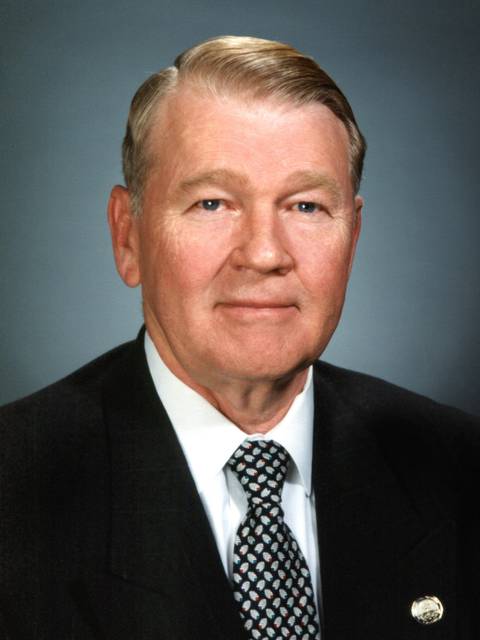University of Wisconsin-Eau Claire Chancellor Emeritus Larry Schnack — a longtime faculty member and campus leader — passed away Monday, Nov. 28.
Schnack retired from UW-Eau Claire in January 1998 after a 32-year career on the campus, which included 19 years of teaching and administrative work followed by a 13-year tenure as the university’s chancellor.
“Dr. Schnack was a highly respected teacher, scholar and chancellor who served UW-Eau Claire extraordinarily well for more than three decades,” says Chancellor James Schmidt. “Many of the things that make UW-Eau Claire so special today — including our nationally recognized undergraduate research program — exist because of his vision and leadership.”

Schnack began his work on the campus in 1965 after earning a doctorate in organic chemistry from Iowa State University. He taught courses in general and organic chemistry in addition to developing computer applications for chemistry.
In 1970, he was appointed assistant to the vice president to coordinate academic support service areas and curricular development planning, followed by terms as assistant vice chancellor (1975-81), acting vice chancellor (1982-83), assistant vice chancellor (1983-84) and acting chancellor (1984-85).
The UW System Board of Regents appointed him chancellor in 1984, a position he held until his retirement in 1998. His time as chancellor was a period of stability in enrollment and university facilities, allowing him to focus his attention on improving and expanding academic programs, according to university records.
Schnack was an outstanding provost and chancellor, says Dr. Brady Foust, a professor emeritus of geography who worked closely with him for many years.
“I saw him often as a department chair and friend,” Foust says. “I was witness to the process of several difficult decisions. He was calm, measured and thoughtful. He would listen, without interruption, to what everyone involved had to say, then pause for a minute or so and deliver a logical and usually simple solution to the question at hand. Once he made a decision, he stuck to it. I can’t think of any decision he made that I disagreed with. I was always pleasantly surprised at the outcome.”
Foust says many of those decisions, especially those involving administrative appointments, “endeared him to the faculty.”
“Larry believed in faculty governance, he supported both the arts and sciences with equal vigor,” Foust says. “I guess that my highest compliment would be that he was a faculty’s chancellor rather than an administrator’s chancellor.”
Early in his career, Schnack was a wonderful mentor who “supported me and always gave me a fair shake,” says Carole Halberg, who served as the university’s alumni director and later president of the UW-Eau Claire Foundation.
“He also had the uncanny ability to do very complicated math calculations in his head, a skill that came in handy during discussions of budgets and funding priorities,” Halberg says.
In 1994, under Schnack’s leadership, a redefined baccalaureate program was established that strengthened general education at UW-Eau Claire. It emphasized study abroad opportunities; promoted faculty-student collaborative research; encouraged the creation of capstone courses in the student’s major; and initiated a service-learning requirement through which students would apply what they had learned in their courses to nonprofit programs in the community. New majors were added in biochemistry/molecular biology and American Indian studies.
The newly redefined undergraduate programs earned UW-Eau Claire regional and national accolades for academic excellence.
“Many of those student-focused programs and initiatives still are in place and are among the reasons that so many talented faculty and students choose to come to UW-Eau Claire,” Schmidt says.
Also, during Schnack’s tenure as chancellor, the test scores and high-school-rank-in-class percentiles of entering freshmen rose, according to university records. The university’s enhanced academic reputation was reflected by its high ranking in the U.S. News & World Report’s list of the best Midwestern regional universities.
As chancellor, Schnack also worked to strengthen ties between the university and the Eau Claire community, an emphasis on campus-community partnerships that continues today.
“UW-Eau Claire would not be the innovative, rigorous, community-focused institution it is today if not for the visionary leadership of Dr. Schnack,” Schmidt says. “Few people in the first century of this university’s history had a greater impact on the students, faculty and staff or helped UW-Eau Claire be recognized for excellence at the regional, state and national level.”
At the time of his retirement, the UW System Board of Regents celebrated Schnack’s successes in “building an academic curriculum that has received national recognition” and his “significant contributions to regional economic development and the quality of life in the Eau Claire region.”
The Board of Regents honored him for his decades of service to higher education and the state of Wisconsin with the title of “chancellor emeritus.”
Dr. Katharine Lyall, who was president of the UW System at the time of his retirement, said, “The history of higher education in Wisconsin deserves a chapter on Larry Schnack. From professor to chancellor, and at every step in between, his focus was on students and improving the quality of undergraduate education and research opportunities.”
Many community, business and higher education leaders, and state and national legislators, also honored Schnack upon his retirement, noting his many years of service to UW-Eau Claire students and the state of Wisconsin.
A memorial service celebrating the life of Dr. Larry Schnack will be held at 11 a.m. Saturday, Dec. 10, at the Hulke Family Funeral Home in Eau Claire. Visitation will begin at 9 a.m. Saturday, at the funeral home, until the time of the service.


